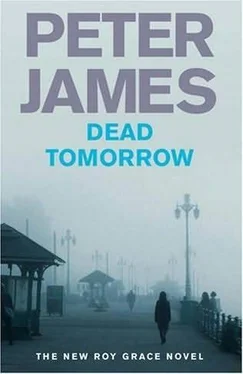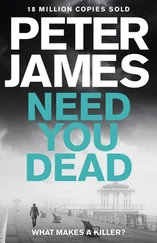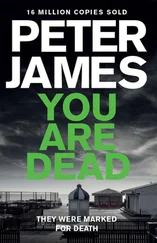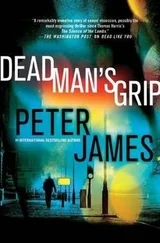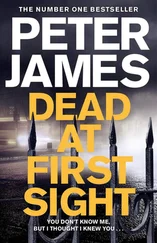‘OK, answer this for me – you just said that Caitlin would have got this liver, had it been OK, because there was no matching recipient higher up the list than her. That could change, right? At any moment?’
‘We have a weekly meeting to decide the priority list,’ Shirley Linsell replied.
‘So it could all change at your next meeting, couldn’t it? If someone in greater need than Caitlin – in your assessment – came along?’
‘Yes, I’m afraid that’s how it works.’
‘That’s great,’ Lynn said, her blood boiling again. ‘You’re like a firing squad, aren’t you? This weekly meeting to decide who is going to live and who’s going to die. It’s like you all pull the trigger, but one of you doesn’t have a bullet in the gun, just a blank. Your patients die and none of you has to take the damn blame.’
Simona lay on the examination couch, wearing just a loose dressing gown. Dr Nicolau, a serious, pleasant-looking man of about forty, strapped a Velcro sleeve around her arm and tightened it, plugged his stethoscope into his ears and pumped the rubber bulb until the sleeve squeezed her arm tightly. Then he looked at a gauge fitted to it.
After a few moments he released the sleeve, nodding, as if everything was fine.
The German woman, who had told her that her name was Marlene, stood beside her. She was beautiful, Simona thought. She was dressed in a sleek, fur-trimmed black suede coat, over a light pink pullover, smart jeans and black leather boots. Her blonde, elegantly tangled hair cascaded around her shoulders, and she smelled of a wonderful perfume.
Simona liked and trusted her. Romeo had been right in his judgement of her, she thought. She was such a confident woman, kind and gentle. Simona had never known her mother, but if she could have chosen a mother, she would have liked her to be a person like Marlene.
‘Just going to take a little blood,’ the doctor said, removing the strap and producing a syringe.
Simona stared at it, cringing in fear.
‘It’s OK, Simona,’ Marlene said.
‘What are you doing?’ she asked, her voice tight.
‘We are giving you a full examination, just to make sure you are healthy. It’s a big investment for us to send you to England. We have to get you a passport, somehow, which is not so easy as you have no papers. And they won’t allow you to work there if you are not healthy.’
Simona shrank away as the needle approached. ‘No,’ she said. ‘NO!’
‘It’s OK, darling Simona!’
‘Where’s Romeo?’
‘He’s outside. He is having the same tests. Would you like him to come in here with you?’
Simona nodded.
The woman opened the door. Romeo came in, his saucer eyes becoming even wider when he saw Simona in her dressing gown.
‘What are they doing?’ Simona asked him.
‘It’s OK,’ Romeo said. ‘They won’t hurt you. We have to have this medical.’
Simona shrieked as she felt the prick in her arm. Then she watched in terror as the doctor drew up the plunger and the plastic barrel filled, slowly and steadily, with her dark red blood.
‘We have to have the certificates to get into the country,’ Romeo said.
‘It hurts.’
Moments later, the syringe was full. The doctor removed it, laid it on a table, then pressed an antiseptic wipe against her arm. He held it for a few seconds, then stuck on a small square of Band-aid in its place.
‘All done!’ he said.
‘Can I go now?’ she asked.
‘Yes, you can go,’ the woman said. ‘You will be in the same place?’
‘Yes,’ Romeo answered for both of them.
‘Then I will come and find you, if we are happy that everything is all right. You can get dressed again now. Are you sure about England, Simona? You are sure you want to go, my little Liebling?’
‘You can get me a job there, can’t you? Me and Romeo? And a flat to live in, in London?’
‘A good job and a nice flat. You will love it.’
Simona looked at Romeo for reassurance. He shrugged, then nodded.
‘Yes,’ she said. ‘I am sure.’
‘Good,’ Marlene said. She kissed Simona on the forehead.
‘When do you think we will go?’ Romeo asked.
‘If your medical results are good, then soon.’
‘How soon?’
‘When do you want to go?’
He shrugged again. ‘Can Valeria come with us?’
‘The one who has a baby?’
‘Yes,’ he said.
‘That’s not possible now. Perhaps later, when you are settled, then we can make arrangements.’
‘She wants to come with us,’ Simona said.
‘It is not possible,’ the German woman said. ‘Not at this time. If you would prefer to stay here in Bucharest to be with her, then you must say so.’
Simona shook her head vigorously. ‘No.’
Romeo also shook his head, equally vigorously, as if afraid Marlene might suddenly change her mind about Simona and himself. ‘No.’
*
Back in Berlin, Marlene Hartmann received a phone call from Dr Nicolau in Bucharest. Simona’s blood type was AB negative. She smiled and noted the details down – it was good to have a rare blood group on her books. She was sure she would find a home for all Simona’s organs very quickly.
After the Tuesday morning briefing meeting of Operation Neptune, Roy Grace drove to the Sussex Police headquarters, twenty minutes away, to update Alison Vosper.
Although she was leaving at the end of the year, to be replaced by a Yorkshire Detective Chief Superintendent called Peter Rigg – about whom he knew little so far – she was still fully hands on for a few weeks more and wanted the usual weekly face-time she had with Roy on any major investigation he was involved with. To his surprise, and relief, today she had been in a strangely subdued mood. He waited for her to kick off, but it hadn’t happened. She listened quietly to his update and dismissed him after only a few minutes.
Now back in his office, scrolling through the endless emails on his screen, he was concentrating on his various lines of enquiry when he was interrupted by a knock on his door and Norman Potting entered, reeking of strong tobacco – no doubt having just nipped outside for quick puff or three on his pipe.
‘Do you have a moment, Roy?’ he asked in his rural burr.
Grace gestured for him to take a seat.
Settling down into the chair in front of the desk, loudly expelling a puff of garlicky breath in the process, Potting said, ‘I wondered if I could have a word with you about Romania? I have something which I didn’t think I should raise publicly at the briefing meeting.’
‘Sure.’ Grace looked at him with interest.
‘Well, I think I might have a short cut. I know that we’ve sent dental records, fingerprints and DNA samples of these three individual to Interpol, but you and I know how long those desk jockeys take to get a result.’
Grace smiled. Interpol was a good organization, but the bureau was indeed full of desk-bound police officers who relied on cooperation with police forces in countries abroad and were seldom able to short-cut rigid time frames.
‘We could be looking at three weeks minimum, at least,’ Norman Potting said. ‘I’ve done some more trawling on the web. There are thousands of street people in Bucharest who live on the margins. If – and it’s only speculation – these three victims are street kids, then it’s unlikely they’ll ever have been to a dentist – and unless they’ve been arrested, there won’t be any fingerprint or DNA records.’
Grace nodded in agreement.
‘There’s a chap I was on a Junior Detective Training course with at Hendon when we were young DCs. Ian Tilling. We became mates and kept in touch. He joined the Met, then after some years he got transferred to Kent Police. Rose to inspector. Long story short, about seventeen years ago his lad was killed in a motorcycle accident. His life fell apart, his marriage bust up, and he took early retirement from the force. Then he decided to do something totally different – you know the syndrome – try to make sense of what had happened and to do something useful. So he went to Romania and began working with street kids. Last time I spoke to him was about five years ago, just after my third marriage went kaput.’ Potting gave a wistful smile. ‘You know how it is, when you are down in your cups, you start going through your address book, phoning up old mates.’
Читать дальше
